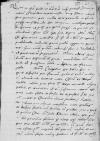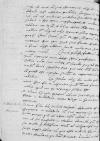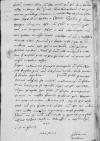24 praeteriti mensis huc perveni per multa certe pericula, ut facile quisque considerando haec tempora intelligere potest. Ex ⌊Genua⌋ 28 Iulii Dominationi Vestrae Reverendissime scripsi ea, quae tunc se obtulerant, hinc autem haec scitu digna addam. ⌊Maiestas caesarea⌋ hic cortis intendit, sed isti boni domini se opponunt quodammodo volentes prius quaedam aggravia exonerari, hinc omnes putant redeundum fore in ⌊Valledolit⌋ ad parturientem ⌊imperatricem⌋. Miror videns hanc aulam tam dissimilem illi priori, mirabiliter enim attrita est durissimo bello in ⌊Affrica⌋ et ⌊Francia⌋ gesto. Dominus ⌊Cornelius Scepperus⌋ his diebus huc in equis dispositis per Franciam habens salvum conductum advolavit tractans inter ⌊caesarem⌋ et ⌊regem Galliae⌋, nescio quae, fuit cum rege veniendo aliquot diebus et revertitur ad eum. Suspicamur negotium esse pacis inter fessos et forsan aere exhaustos, sed de his non omittet dominus ⌊Cornelius⌋ clarius scribere, si licebit. De induciis pro aliquot mensibus inter ⌊Gallos⌋ et ⌊Belgas⌋ factis nil dubito iam pridem scire Vestram Reverendissimam Dominatio, de quibus ⌊caesar⌋ non satis contentus videtur esse, cum in illis partibus felicius quam alias usque bellatum sit pro eius maiestate. Sunt qui opinantur omnino pacem brevi nos visuros, cum maximam illam pecuniam nostram et amicorum nostrorum, forsan omnium, hactenus ad fundum evertimus.
 UUB, H. 154, f. 153v
UUB, H. 154, f. 153v
⌊Indiae⌋ ille novae non sine admiratione aliquamdiu nihil dederunt, causa nescitur publice. ⌊Fucchari⌋ cum ⌊Welseris⌋ non nisi centenis millibus sua debita computando habent in his terris magistrasgos et multos alios redditus, nec tamen de omnibus debitis contentati. Grimaldus cum aliquot aliis ⌊Genuensibus⌋ expectant partum istarum ⌊corcium⌋, cum et ipsi non parum olei iniecerint huic igni, quod sine fructu hactenus in fumum abiisse videtur, tantae molis erat hactenus nutrire ⌊Martem⌋. ⌊Comitem palatinum Fredericum⌋ certo dicunt superiore anno dedisse ⌊caesari⌋ proficiscenti in ⌊Gallias⌋ omnes suos milites cum sacculo, qui ad expugnandam ⌊Daniam⌋ sepositus erat. Quae res nostro domino duci non potest esse ingrata, similiter et negociatoribus nostratibus. Ex ⌊Italia⌋ aliquamdiu nulla posta venit, hinc fit ut nesciatur, quid ⌊Turcae⌋ faciant, melius apud vos ex Venetiis sciuntur haec. Dominus ⌊Ulricus Ehinger⌋ extremum diem vitae suae clausit mense praeterito in ⌊Valledolit⌋ relicta coniuge in horas partum exspectante.
⌊Ioanna⌋ filia dominae ⌊Isabellae Delgadae⌋ desponsata est domino ⌊Graciano⌋ in ⌊Valledolit⌋ non sine caeremoniis et singulari pompa, quam ille suo sumptu on the margin⌈suo sumptusuo sumptu on the margin⌉ elegantissime vestitam a matre eius ad ⌊suam⌋ transtulit in ⌊Medina⌋ educandam, cum adhuc sit tenella, sed bellisima. Dicunt eum diligentissime inquisivisse elapsis diebus, num quis esset in aula reverendissimo domino ⌊oratori⌋ familiaris, qui litteras dirigat. Laudant omnes factum ⌊matris⌋ ⌊illius⌋ non adeo, dicunt enim eum bene habere esseque in domo domini ⌊Covos⌋ bene commendatum, cum eius opera quandoque utantur in vertendis epistolis, praeter haec stipendium habet a ⌊caesare⌋, ⌊Galliae⌋ quoque dicitur egregie obnoxius esse, non solum in noviluniis, verum omni tempore. Haec a domino ⌊Obernburger⌋, nostro sene ⌊Petro⌋ et aliis notis intellexi, ubi autem in ⌊Valledolit⌋ erimus, videbo hominem, qui forsan volet super ea re conferre mecum. Ego agam, ut me decebit, nullum penitus habens mandatum. ⌊Matrem⌋ quoque dicunt velle, ut aliquid ei mittatur, sed consultum puto, ut pro honore vel non pauca vel nihil mittatur etc.
Super matrimonio ⌊principis Portugaliae⌋ cum ⌊filia ⌊regis Angliae⌋⌋, quem nunc ditissimum vocant, dicunt tractari, sed forsan tepidius. Similiter dicunt ⌊principem Oraniae⌋ aliquamdiu spe nutritum matrimonii cum filia ducis Lotringiae, sed repulsam supervenisse, opinantur aliqui propter haec bella, cum forsan ⌊principatus Oraniae⌋ in medio ⌊Franciae⌋ existens, per regem inimico, ut antea, ademtus sit. Sed de his rebus certi nil scio hactenus, obiter enim haec hic audivi nec audeo curiosius inquirere, causa patet. Iterum me humiliter commendo Vestrae Reverendissimae Dominationi, quae felicissime valeat.




 UUB, H. 154, f. 154v
UUB, H. 154, f. 154v